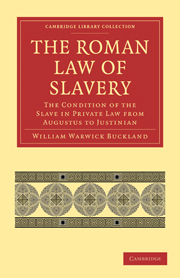Book contents
- Frontmatter
- PREFACE
- Contents
- ERRATA, ADDENDA, AND LIST OF ABBREVIATIONS
- LIST OF PRINCIPAL ABBREVIATIONS
- PART I CONDITION OF THE SLAVE
- PART II ENSLAVEMENT AND RELEASE FROM SLAVERY
- CHAPTER XVII Enslavement
- CHAPTER XVIII Enslavement (cont.)
- CHAPTER XIX Outline of Law of Manumission during the Republic
- CHAPTER XX Manumission during the Empire. Forms
- CHAPTER XXI Manumission during the Empire (cont.). Manumission by Will (cont.). Dies, Conditio, Institutio
- CHAPTER XXII Manumission during the Empire (cont.). Fideicommissary Gifts
- CHAPTER XXIII Manumission during the Empire (cont.). Statutory Changes
- CHAPTER XXIV Manumission under Justinian
- CHAPTER XXV Manumission. Special Cases and Minor Restrictions
- CHAPTER XXVI Freedom independent of Manumission
- CHAPTER XXVII Freedom without Manumission. Uncompleted Manumission
- CHAPTER XXVIII Questions of Status as affected by Lapse of Time, Death, Judicial Decision, etc.
- CHAPTER XXIX Effect after Manumission of Events during Slavery. Obligatio Naturalis
- APPENDIX I The relation of the contractual actions adiectitiae qualitatis to the Theory of Representation
- APPENDIX II Formulation and Litis Consumptio in the actions adiectitiae qualitatis
- APPENDIX III Form used by Slave in acquisition by Mancipatio, etc.
- APPENDIX IV The essential character of Manumission: Iteratio
- APPENDIX V Manumission vindicta by a, filiusfamilias
- INDEX
CHAPTER XXVIII - Questions of Status as affected by Lapse of Time, Death, Judicial Decision, etc.
Published online by Cambridge University Press: 07 September 2010
- Frontmatter
- PREFACE
- Contents
- ERRATA, ADDENDA, AND LIST OF ABBREVIATIONS
- LIST OF PRINCIPAL ABBREVIATIONS
- PART I CONDITION OF THE SLAVE
- PART II ENSLAVEMENT AND RELEASE FROM SLAVERY
- CHAPTER XVII Enslavement
- CHAPTER XVIII Enslavement (cont.)
- CHAPTER XIX Outline of Law of Manumission during the Republic
- CHAPTER XX Manumission during the Empire. Forms
- CHAPTER XXI Manumission during the Empire (cont.). Manumission by Will (cont.). Dies, Conditio, Institutio
- CHAPTER XXII Manumission during the Empire (cont.). Fideicommissary Gifts
- CHAPTER XXIII Manumission during the Empire (cont.). Statutory Changes
- CHAPTER XXIV Manumission under Justinian
- CHAPTER XXV Manumission. Special Cases and Minor Restrictions
- CHAPTER XXVI Freedom independent of Manumission
- CHAPTER XXVII Freedom without Manumission. Uncompleted Manumission
- CHAPTER XXVIII Questions of Status as affected by Lapse of Time, Death, Judicial Decision, etc.
- CHAPTER XXIX Effect after Manumission of Events during Slavery. Obligatio Naturalis
- APPENDIX I The relation of the contractual actions adiectitiae qualitatis to the Theory of Representation
- APPENDIX II Formulation and Litis Consumptio in the actions adiectitiae qualitatis
- APPENDIX III Form used by Slave in acquisition by Mancipatio, etc.
- APPENDIX IV The essential character of Manumission: Iteratio
- APPENDIX V Manumission vindicta by a, filiusfamilias
- INDEX
Summary
In general an owner can free, but no pact or agreement can make a freeman a slave, or endow a slave or libertinus with ingenuitas, or make an ingenuus a libertinus. Acting as a slave will not make a free person a slave. An acknowledgment by a man that he is a slave, whether it be voluntary or compelled, does not make him one, even if it be formally made apud acta praesidis. Paul's language may confine this rule to the case in which the admission was compelled by fear. But in the later law this restriction has disappeared if it ever existed, and it is most probable that Paul is merely giving an illustration of the circumstances under which such a false admission is likely to be made. In what purport to be two enactments of Diocletian, we are told generally, that acknowledgment of slavery apud acta or by professio is no bar. Similarly, whatever may have been the law under the old system of the Census, a failure to make proper professio as a ciins does not cause enslavement. The fact that a free person has been sold as a slave by his parents, or an apparent owner, or by the Fisc or by rebels is no bar to his claim of freedom. A similar statement is made in an enactment of A.D. 293 as to one who, being under 20, allows himself to be given as part of a dos. The same rule is laid down in an enactment of the following year without limit of age where the person sold was not aware of his freedom.
- Type
- Chapter
- Information
- The Roman Law of SlaveryThe Condition of the Slave in Private Law from Augustus to Justinian, pp. 647 - 675Publisher: Cambridge University PressPrint publication year: 2010First published in: 1908



